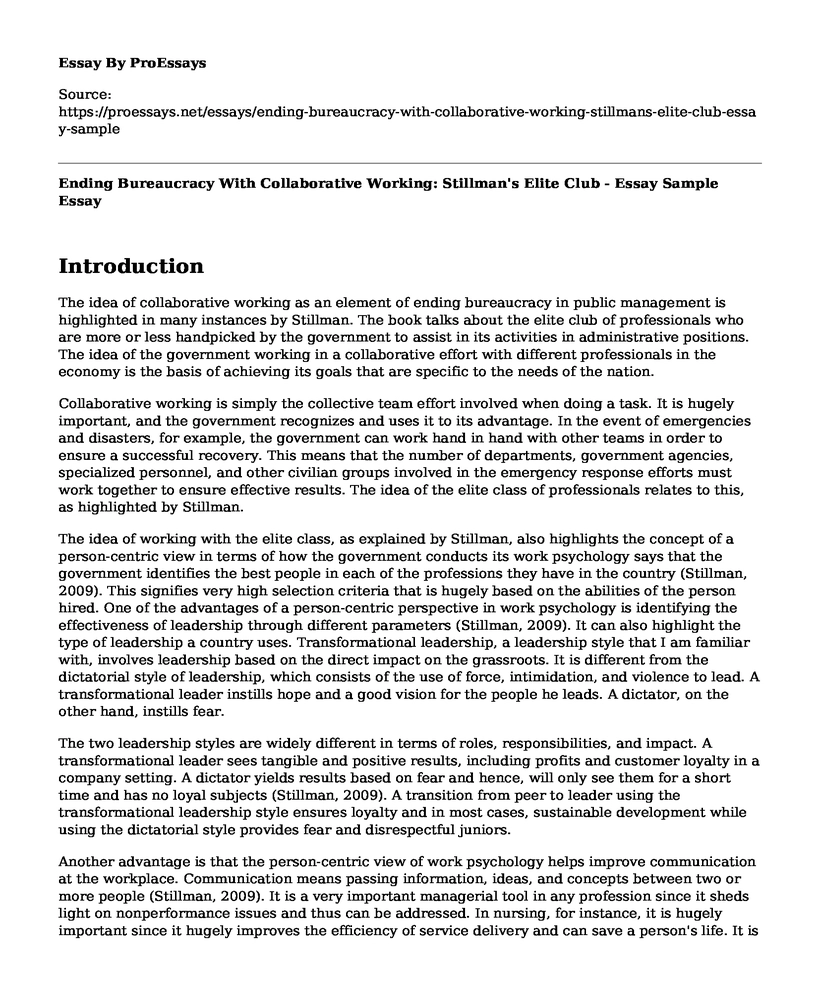Introduction
The idea of collaborative working as an element of ending bureaucracy in public management is highlighted in many instances by Stillman. The book talks about the elite club of professionals who are more or less handpicked by the government to assist in its activities in administrative positions. The idea of the government working in a collaborative effort with different professionals in the economy is the basis of achieving its goals that are specific to the needs of the nation.
Collaborative working is simply the collective team effort involved when doing a task. It is hugely important, and the government recognizes and uses it to its advantage. In the event of emergencies and disasters, for example, the government can work hand in hand with other teams in order to ensure a successful recovery. This means that the number of departments, government agencies, specialized personnel, and other civilian groups involved in the emergency response efforts must work together to ensure effective results. The idea of the elite class of professionals relates to this, as highlighted by Stillman.
The idea of working with the elite class, as explained by Stillman, also highlights the concept of a person-centric view in terms of how the government conducts its work psychology says that the government identifies the best people in each of the professions they have in the country (Stillman, 2009). This signifies very high selection criteria that is hugely based on the abilities of the person hired. One of the advantages of a person-centric perspective in work psychology is identifying the effectiveness of leadership through different parameters (Stillman, 2009). It can also highlight the type of leadership a country uses. Transformational leadership, a leadership style that I am familiar with, involves leadership based on the direct impact on the grassroots. It is different from the dictatorial style of leadership, which consists of the use of force, intimidation, and violence to lead. A transformational leader instills hope and a good vision for the people he leads. A dictator, on the other hand, instills fear.
The two leadership styles are widely different in terms of roles, responsibilities, and impact. A transformational leader sees tangible and positive results, including profits and customer loyalty in a company setting. A dictator yields results based on fear and hence, will only see them for a short time and has no loyal subjects (Stillman, 2009). A transition from peer to leader using the transformational leadership style ensures loyalty and in most cases, sustainable development while using the dictatorial style provides fear and disrespectful juniors.
Another advantage is that the person-centric view of work psychology helps improve communication at the workplace. Communication means passing information, ideas, and concepts between two or more people (Stillman, 2009). It is a very important managerial tool in any profession since it sheds light on nonperformance issues and thus can be addressed. In nursing, for instance, it is hugely important since it hugely improves the efficiency of service delivery and can save a person's life. It is a theory that facilitates positive interaction between different species of life.
To break it down further, it involves the elements of marketing, hospital levels of bureaucracy, and medical interventions such as operations that are carried out on patients that visit the hospital. All these forms of communication, despite them being verbal and nonverbal, add up to tell the world what the hospital as a brand is like. It is therefore important to find and manage such information beforehand. The government works more or less the same way. It needs to find a way it can communicate with its people. Stillman (2009) puts it as "..state SES systems contain too many lofty and contradictory goals that cannot all be satisfied." This leads to many high ranking state officials imposing bureaucratic tendencies on the various systems of government that the junior officers have to follow. Stillman (2009) also highlights the fact that in most cases, the junior officers are threatened with losing their jobs. This presents itself as a disadvantage to the person-centric view of work psychology since it is the same high ranking elite professionals who are appointed as ministers, ambassadors, and other high ranking government positions of influence. This hugely facilitates a slow state SES system.
Conclusion
In a nutshell, collaborative working in government has a distinct way of making the government have a professional look without a shadow of a doubt. It, however, also highlights a subculture of bureaucracy on the government's side. This, in turn, leads to vices by junior government officials and representatives in a bid to adapt to the system and get a piece of the 'pie' at the top. It is seen through public intimidation, corruption by government officials and police and misuse of public funds. The corrupt government officials also seek to consolidate and maintain as much power as they possibly can. This creates a vicious system that clogs the government's ability to work efficiently. The two leadership styles discussed are widely different in terms of roles, responsibilities, and impact.
Reference
Stillman, R. (2009). Public administration: Concepts and cases. Nelson Education.
Cite this page
Ending Bureaucracy With Collaborative Working: Stillman's Elite Club - Essay Sample. (2023, Feb 13). Retrieved from https://proessays.net/essays/ending-bureaucracy-with-collaborative-working-stillmans-elite-club-essay-sample
If you are the original author of this essay and no longer wish to have it published on the ProEssays website, please click below to request its removal:
- The Dominican Republic - Research Paper
- Team Work and Differences in Culture Essay
- The Concept of Government Regulation of Social Media Paper Example
- Essay Sample on Barak Obama's ACA: Wider Access to Healthcare or Controversy?
- Essay Example on Municipalities: Balancing Local, Provincial and National Interests
- Report Sample on the U.S. Healthcare System: A Complex Network of Providers and Regulators
- Essay Sample on Healthcare Workers During This Covid-19







